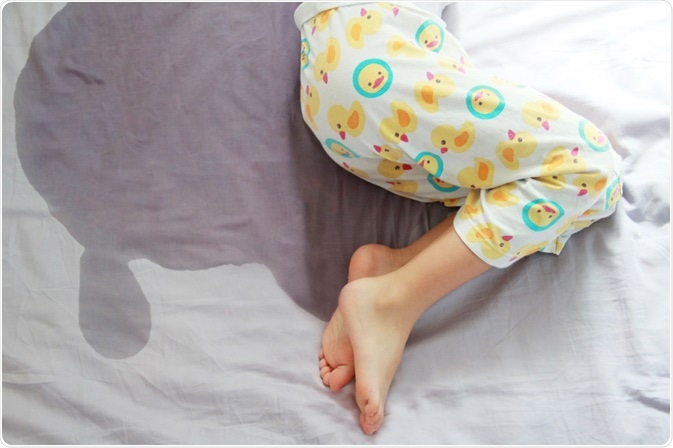Urinary incontinence, which is also referred to as enuresis when specifically relating to children, is the involuntary loss of urine.
It is normal for young children to be unable to control their urge to urinate; however, once they reach the age of five, children should be toilet trained and thus able to control when they urinate. After this point, urinary incontinence becomes an issue that requires further management.

Image Credit: Mama Belle and the Kids / Shutterstock.com
Infant urine control and toilet training
Babies do not have any control over when they urinate; therefore, when their bladder fills to a specific point, the muscles automatically contract to void their bladders.
As the brain and nervous system of babies grow and mature, the brain begins to recognize messages that indicate the bladder is almost full and sends signals to the bladder. This allows the child to hold the contractions until they can reach an appropriate place to urinate.
This usually happens at approximately two years of age when the toddler is toilet trained, although the age can vary greatly between children.
Epidemiology
Young boys are more likely to have difficulty controlling urination and experience incontinence as compared to young girls. Urinary incontinence in children is separated into daytime and nighttime occurrences.
Approximately 17-20% of children experience symptoms during the day, with 1 in 20 of these children also suffering from bedwetting during the night. Incontinence at nighttime alone has a prevalence of approximately 8-20% in children who are five years old. Some individuals do not grow out of the condition and continue to lack bladder control during the nighttime until adulthood.
Psychological impact
It is common for children affected by urinary incontinence to be significantly impacted psychologically, which can make a difference in their overall wellbeing and quality of life.
When children are beginning to interact socially with other children, the experiences they have made a lasting impression on their character. Incontinence can present embarrassing situations for children that shape their character.
As a result, it is imperative that children over the age of five with urinary incontinence are managed appropriately. Assessment of the condition should be made to identify possible causes and interventions that could offer a benefit. Successful treatment can make a significant difference in their symptoms and the psychosocial wellbeing of the child.
Pediatrics – Enuresis: By Chris Cooper M.D.
Causes
There are several possible causes of enuresis including:
- Anxiety
- Attention-Deficit/Hyperactivity Disorder (ADHD)
- Caffeine
- Constipation
- Undiagnosed diabetes
- Hormonal imbalances
- Overactive bladder
- Delayed mental development
- Small bladder
- Anatomical abnormalities of urinary tract
- Urinary tract infection
Where possible, potential causes should be identified to assist in the management of the condition.
Non-pharmacological therapy
In most cases, management should begin without the use of medications, as it is likely the child will outgrow the problem with the appropriate care.
Initially, behavioral changes should be made, such as limiting fluid intake, particularly at problematic times of the day, such as before bed. Caffeine is a known diuretic and increases the frequency of urination; therefore, beverages that contain caffeine, such as sodas and other carbonated drinks, should be avoided.
For children who suffer from symptoms during the night and bedwetting, there may be a benefit to awaking these children midway through the night to take them to the toilet. Additionally, a moisture alarm that is set to sound when it detects urine can help to wake the child when close to urination.
If symptoms during the day pose a greater problem, bladder training techniques may be beneficial. This includes exercises and a schedule to urinate that help to create a routine and form good urination habits.
Counseling for the child may also be useful to help work through any related stress or life changes that may be impacting the ability to remain continent.
Pharmacological therapy
Medications are often needed in the management of other underlying health conditions, such as ADHD and constipation, to improve symptoms of incontinence.
If an overactive bladder is likely to be problematic, anticholinergic drugs may help to inhibit the contraction of the detrusor muscle of the bladder and related incontinence.
References
Further Reading
Last Updated: Nov 26, 2022